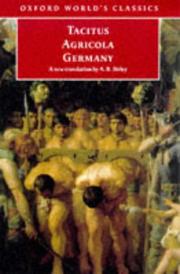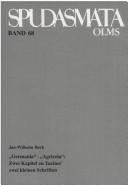| Listing 1 - 4 of 4 |
Sort by
|

ISBN: 0191828424 1280680164 9786613657091 0191587540 9780191587542 0192833006 9780192833006 0191605298 Year: 1999 Publisher: Oxford : Oxford University Press,
Abstract | Keywords | Export | Availability | Bookmark
 Loading...
Loading...Choose an application
- Reference Manager
- EndNote
- RefWorks (Direct export to RefWorks)
Cornelius Tacitus, Rome's greatest historian, was inspired to take up his pen when the assassination of Domitian ended `fifteen years of enforced silence'. Agricola is the biography of his late father-in-law and an account of Roman Britain. Germania gives insight into Rome's most dangerous enemies, the Germans, and is the only surviving specimen from the ancient world of an ethnographic study. Each in its way has had immense influence on our perception of Romeand the northern `barbarians' and the edition reflects recent research in Roman-British and Roman-German history. - ;`Long may the barba
Statesmen --- Germanic peoples. --- Germanic tribes --- Ethnology --- Indo-Europeans --- Teutonic race --- Agricola, Gnaeus Julius, --- Agricola, Cn. Julius, --- Agricola, Julius, --- Agricola, Cn. Julius --- Agricola,
Book
ISBN: 1282911902 9786612911903 3110239086 9783110239089 9783110224191 3110224194 Year: 2010 Publisher: Berlin: de Gruyter,
Abstract | Keywords | Export | Availability | Bookmark
 Loading...
Loading...Choose an application
- Reference Manager
- EndNote
- RefWorks (Direct export to RefWorks)
The life and deeds of Gnaeus Iulius Agricola ? governor of the Roman province of Britannia under the Flavian emperors ? are best retold by his son-in-law, Tacitus. Tacitus describes not only the successful Roman campaigns in Britannia, but also the characteristics of the country. Thus, his Agricola is one of most elemental sources for the study of the history andinner structure of this northernmost Roman province.
Statesmen --- Agricola, Gnaeus Julius, --- Agricola, Cn. Julius, --- Agricola, Julius, --- Agricola, Cn. Julius --- Agricola, --- Rome --- History --- Rome - History - Julio-Claudians, 30 BC-68 AD --- Britannia /1st century. --- Gnaeus Iulius Agricola. --- Roman History. --- Tacitus, Cornelius.
Book
ISBN: 3110958848 9783110958843 9783598718434 3598718438 Year: 1970 Publisher: Leipzig BSB B.G. Teubner Verlagsgesellschaft
Abstract | Keywords | Export | Availability | Bookmark
 Loading...
Loading...Choose an application
- Reference Manager
- EndNote
- RefWorks (Direct export to RefWorks)
Cornelius Tacitus, Rome's greatest historian and the last great writer of classical Latin prose, produced his first two books in AD 98, after the assination of the Emperor Domitian ended fifteen years of enforced silence. Much of Agricola, which is the biography of Tacitus' late father-in-law Julius Agricola, is devoted to Britain and its people, since Agricola's claim to fame was that as governor for seven years he had completed the conquest of Britain, begun four decades earlier. Germany provides an account of Rome's most dangerous enemies, the Germans, and is the only surviving example of a
Civilization, Germanic. --- Rhetoric. --- Germanic civilization --- Germanic peoples --- Teutonic civilization --- Language and languages --- Speaking --- Authorship --- Expression --- Literary style --- Civilization --- Rhetoric --- Agricola, Gnaeus Julius, --- Agricola, Cn. Julius, --- Agricola, Julius, --- Agricola, Cn. Julius --- Agricola, --- Rome --- History

ISBN: 3487107422 Year: 1998 Publisher: Hildesheim : Georg Olms,
Abstract | Keywords | Export | Availability | Bookmark
 Loading...
Loading...Choose an application
- Reference Manager
- EndNote
- RefWorks (Direct export to RefWorks)
Germanic peoples --- -Statesmen --- -Public officers --- Germanic tribes --- Ethnology --- Indo-Europeans --- Teutonic race --- Historiography --- Biography --- Agricola, Gnaeus Julius --- Tacitus, Cornelius --- Tacite, --- Tacito --- Tacito, Caio Cornelio --- Tacitus, C. Cornelius --- Tacitus, Caius Cornelius --- Tacitus, Gaius Cornelius --- Tacitus, P. Cornelius --- Tacitus, Publius Cornelius --- Tat︠s︡it, Korneliĭ --- Taxituo --- טאקיטוס, קורנליוס --- -Historiography --- -Germanic tribes --- Tacite --- Statesmen --- Agricola, Gnaeus Julius, --- Tacitus, Cornelius. --- Krebs, Christopher B. --- Agricola, Cn. Julius, --- Agricola, Julius, --- Agricola, Cn. Julius --- Agricola,
| Listing 1 - 4 of 4 |
Sort by
|

 Search
Search Feedback
Feedback About UniCat
About UniCat  Help
Help News
News